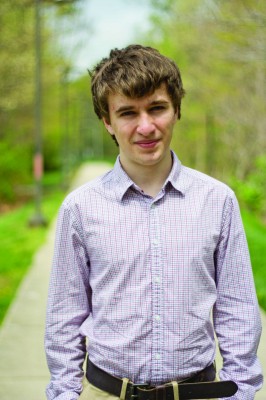Over the series of three articles, Stepan Gordeev shares his experiences as an international student
The previous part had ended right before the beginning of the semester. I was pretty nervous and curious at the same time. I was waiting for my first days of a very different college in a very different country to start, and I didn’t know what to expect. It turned out that there are a few things in US education that I wasn’t prepared for.
When the classes started on Aug. 27, 2012, the first thing that surprised me was the incredible freedom — or lack of discipline, whatever you want to call it — in the classroom. Students can come and leave whenever they so desire, eat and drink in the classroom and do all kinds of stuff that would severely affect the student’s grade if he or she did it in a Russian university.
It would be a lie to say that an average Russian college is the stronghold of discipline and obedience. It is not, Russian students love being free and independent just as their American colleagues. But the need for some sort of discipline in education is not being questioned or doubted. The eternal struggle between supervising teachers and disobeying students is what we are used to and take for granted.
In Russia, teachers definitely have a higher position and more rights than students, where in the U.S. they are almost equal. I am not going to discuss what is better — each way has its advantages and disadvantages. Anyway, I, being used to the “Russian way”, still can’t let myself eat during class or leave in the middle of the lecture.
The second thing I encountered — which I still can’t get used to — was when I went to the gym near Presidents Park for the first time. I always warm up on a treadmill by running at 10 km/h. Although I hadn’t been going to the gym for a couple of months, I decided not to make that day an exception. I started by slowly increasing speed, and I already felt a bit uncomfortable on the speed of 6-7. I decided that it’s probably the result of a long break in my training and continued increasing speed.
However, on nine I felt like Hermes, slowly taking off from the ground. I had to reduce speed to 6.5 and ran on that speed for the rest of my warm up. Only when I was going home from the gym I suddenly understood my mistake: numbers on the treadmill display weren’t kilometers per hour.
Of course, I knew that America still uses the least obvious and least convenient way to measure things that has ever existed on the surface of this planet. I even knew some of the ratios between metric and imperial units, but still I forgot about it that day. Since then, I made some progress on this matter, but I’m not fully accustomed to it yet. I still have no idea how large an ounce is, and only today, I found out that an American ton is not a metric ton.
The last and biggest difference I would like to address is in the way programs of study are formed. While in the U.S., students are free to choose any classes they want and create their own schedule, but in Russia it is completely different. The set and order of classes is the same for all students pursuing a particular degree — there are no electives or anything like that.
Upon admission, students of the same specialization are formed in groups. One group usually consists of 20-30 students with the same schedule. They go to all classes together ,and they hang out together. Although I like the ability to choose classes here, I really miss having such company.
Our grade schools work by the same principle: 20-30 students go to all classes together from the first until the last grade.
When you spend half of your time with the same people, there is no way you can avoid becoming best friends with some of them. And believe me, having a small circle of close friends, where everybody knows everybody, is one of the best things you can have in life. You can say that there are fraternities and sororities in US colleges. Yes, but partying with the same people over and over again is not equal to working with them every day, facing the same challenges, same problems and overcoming them together. And partying after that, yes. Bonds formed in Russian universities last for a person’s whole life. When I see adult best friends on my motherland, I know those are their college group mates.
I’m not saying that you can’t make friends in the United States—you can, and you can find people very close to you in their perception of the world and become best friends with them. But you probably won’t have many mutual friends with these guys or company to hang out with together.
After spending seven months in this country, I saw many amazing things here. Yes, not everything is as good as it is shown in the movies, but Mason is a great place to study with many great people. I am happy that my life brought me here, and despite some small things I don’t really like—feet, pounds, and ounces, for example—I don’t regret coming to this college.







Comments